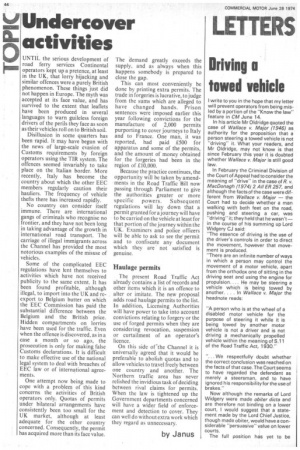Undercover activities
Page 46

If you've noticed an error in this article please click here to report it so we can fix it.
UNTIL the serious development of road ferry services Continental operators kept up a pretence, at least in the UK, that lorry hijacking and similar offences were a purely British phenomenon. These things just did not happen in Europe. The myth was accepted at its face value, and has survived to the extent that leaflets have been produced in several languages to warn guileless foreign drivers of the perils they face as soon as their vehicles roll on to British soil.
Disillusion in some quarters has been rapid. It may have begun with the news of large-scale evasion of Customs requirements by foreign operators using the TIR system. The offences seemed invariably to take place on the Italian border. More recently, Italy has become the country about which the other EEC members regularly caution their hauliers. The frequency of vehicle thefts there has increased rapidly.
No country can consider itself immune. There are international gangs of criminals who recognise no frontier, and they have not been long in taking advantage of the growth in international road transport. The carriage of illegal immigrants across the Channel has provided the most notorious examples of the misuse of vehicles.
Some of the complicated EEC regulations have lent themselves to activities which have not received publicity to the same extent. It has been found profitable, although illegal, to import into the UK and reexport to Belgium butter on which the EEC Commission has paid the substantial difference between the Belgium and the British price. Hidden compartments on lorries have been used for the traffic. Even when the offence is discovered, as in a case a month or so ago, the prosecution is only for making false Customs declarations. It is difficult to make effective use of the national legal system to deal with breaches of EEC law or of international agreements.
One attempt now being made to cope with a problem of this kind concerns the activities of British operators only. Quotas of permits under bilateral arrangements have consistently been too small for the UK market, although at least adequate for the other country concerned. Consequently, the permit has acquired more than its face value. The demand greatly exceeds the supply, and as always when this happens somebody is prepared to close the gap.
This can most conveniently be done by printing extra permits. The trade in forgeries is lucrative, to judge from the sums which are alleged to have changed hands. Prison sentences were imposed earlier this year following convictions for the manufacture of 2,000 permits purporting to cover journeys to Italy and to France. One man, it was reported, had paid £500 for apparatus and some of the permits, and the amount of money obtained for the forgeries had been in the region of £1 0,000.
Because the practice continues, the opportunity will be taken by amend
• ments in the Road Traffic Bill now passing through Parliament to give the authorities greater or more specific powers. Subsequent regulations will lay down that a permit granted for a journey will have to be carried on the vehicle at least for that portion of the journey within the UK. Examiners and police officers will be able to ask to see the permit and to confiscate any document which they are not satisfied is genuine.
Haulage permits
The present Road Traffic Act already contains a list of records and other items which it is an offence to alter or imitate. The new proposal adds road haulage permits to the list. In addition, Licensing Authorities will have power to take into account convictions relating to forgery or the use of forged permits when they are considering revocation, suspension or curtailment of an operator's licence.
On this side orthe Channel it is universally agreed that it would be preferable to abolish quotas and to allow vehicles to travel freely between one country and another. The Northern traffic area has never relished the invidious task of deciding between rival claims for permits. When the law is tightened up the Government departments concerned will have a wider field of enforcement and detection to cover. They can well do without extra work which they regard as unnecessary.
by Janus












































































































